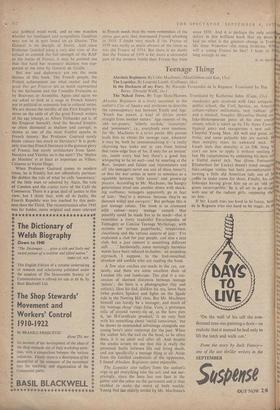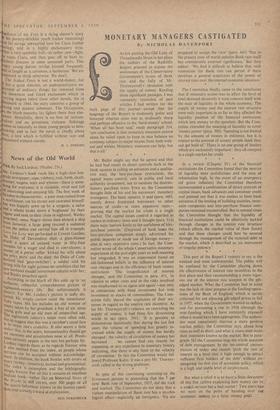Teenage Thing
Reguera. Translated by Ilsa
Oyi
possibly could be made has to be made—that it resembles a (very readable) Encyclopedia of Teenagery or Concise Teenage Mythology, with sections on 'serious paperbacks,' temperance, cleanliness and the various aspects of jazz: 'I've explained a club for jazz people, and also a jazz club, but a jazz concert is something different still. . . .' Incidentally, some seemingly harmless words have been reduced to dashes : an unspoken reproach, I suppose, to the foul-mouthed, drunken old sordids who are reading the book.
A few nice catches are made in the rye, cer- tainly, and there are some excellent shots of London life and landscape. The plot is a suc- cession of shortest distances between teenage `points': the hero is a photographer (lay and artistic), likes his dad, dislikes his ma, loves Suze (who prefers Spades) and fights on the Spade side in the Notting Hill riots. But Mr. Maclnnes himself can hardly be a teenager, and much of his 'teenage thing' rings false. Vern, a grotesque relic of around twenty-six or, as the hero puts it, 'an H-Certificate product,' is an easy butt with his mumbling about 'social conscience,' but he shows to unintended advantage alongside our young hero's utter contempt -for 'the past. When the author hits the nail on the head, as he often does, it is an adult nail after all. And despite the smoke screen we see that this is really the perennial battle between life and living death, and not specifically a teenage thing at all. Aside from the falsified credentials of the opponents, I found Absolute Beginners most enjoyable.
The Lopsider also suffers from the author's urge to get everything into the act; and not sur- prisingly, since the hero has one foot in the glitter and the other on the pavement and is thus enabled • to make the worst of both worlds. Young Nat (an elderly sordid by Mr. MacInnes's The Naked Trees. By Tage Skou-Hansen. Absolute Beginners is a lively successor to the author's City of Spades and professes to describe the contemporary war between Youth and Age. `Youth has power, a kind of divine power straight from mother nature.' Age consists of the `old tax-payers,' sordids,' 'conscripts' and 'pensioners': i.e., everybody over nineteen, for Mr. Maclnnes is a strict purist. His purism leads him to vitiate the teenage case, whatever it may be, both by sentimentalising it—`a really charming boy looks out at you from behind that razor-edge face of his, if only for an instant' (or, inside every bad boy there's a good boy whispering to be let out)—and by sneering at the Rest, `toupets and falsies and rejuvenators and all' (do teenagers never Use any of these items?), so that the war comes to seem as senseless as a squabble between 'little eyases' and grown-up players. According to Mr. Maclnnes, the hungry generations tread one another down with shock- ing swiftness; teenagers apparently go .in fear of kids : 'they're a menace, because they're so damned wilful and energetic.' But perhaps this is just teenage colour. The book is so crammed with colour—every teenage remark that Translated by Katherine John. (Cape, 15s.) standards) gets involved with fake antiques public school, the Civil. Service, an Amerit culture-vulture millionaire, two 'radiant' g and a musical, Naughty Messalina (based or fake-Shakespearian piece of his own corn' sition), which is taken up by The News Tram (typical joke) and inaugurates a new cult Cheerful Young .Men. All well and good, w frolic, and some palpable hits are scored. I then morality rears its awkward neck. Louth feels that morality is an OK thing I can't see haw to apply it without spoiling fun. He compromises by endowing his hero w a fretful moral itch. Nat (from Fortunat Elizabethan for Lucky) doesn't mind smuggli fake-antique violins but feels uncomfortable turning a little old American lady out of coffin to make room for them. Finally, his ct federates having given him up as an 'old pi green incorruptible,' he is all set to go strait with one of the radiant girls, supposing shi
let him.
If Mr. Louth tries too hard to be funny, Sen de la Reguera tries too hard to be tragic. In
; 30 Mt
10' ilh
let :3' phi
of
111 :3 (31. it•S
hi hal
0 On
111a 10V
ten
17( Ms
Bra dig thi;
of
Oc a v bu any vit nrt
IC
Is
r'
arkness of my Fury is a dying doctor's story f his poverty-stricken youth (rather interesting) nd his savage unrequited love for Clara (rather °ring), told in a highly exclamatory style. fter a very symbolic bull—or rather cow—fight, e rapes Clara, and then goes off to hunt in- ectious diseases in some unnamed parts. This ngry young doctor reviles himself frequently nd at length as `a caveman, a barbarian.' We are LIPposed to think otherwise. We don't. • The Naked Trees is not a world-shaker, but has a quiet stoicism, an undemonstrative en- Yrnent of ordinary things, far removed from he showiness and faked excitement which in drying degree infect these other novels. Set in enmark in 1944, the story concerns a group of eung and modest saboteurs. The Occupation, s the blurb remarks, lay lighter there than else-
. here. Mercifully, there is no hint of resisten- halism and no gratuitous violence. Sabotage
omes as naturally to these young people as love- `' nuking, and in fact the novel is chiefly about love, a love which is fulfilled without rape and o renounced without suicide. lb
11 D. J. ENRIGHT



































 Previous page
Previous page